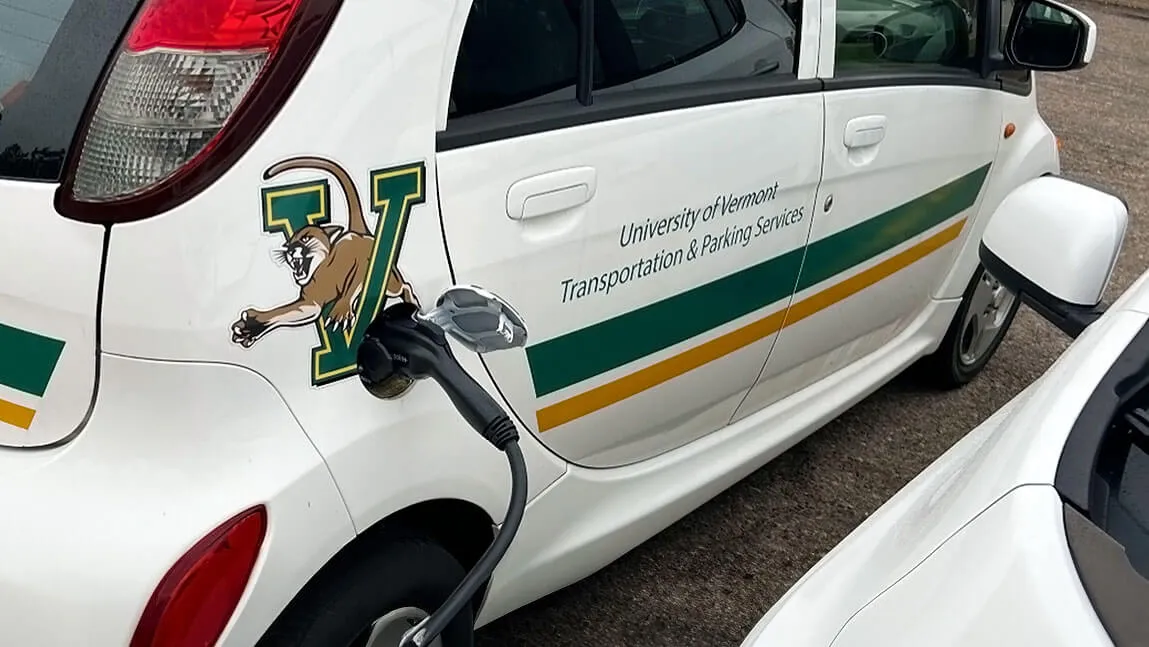Just one year after announcing its first Comprehensive Sustainability Plan (CSP) last Earth Day, the University of Vermont has built strong momentum toward the goal of achieving carbon neutrality by the end of the decade.
Over the past 12 months, UVM tripled its fleet of electric vehicles, drilled a test well to explore the possibilities of geothermal energy on campus and purchased local carbon credits to significantly reduce UVM’s Scope III emissions.
"This university is dedicated to research, discovery, and action for people and planet. The steadfast commitment to sustainability we’ve made in our Comprehensive Sustainability Plan reflects that dedication,” said President Suresh Garimella. “The plan guides the efforts of our students, faculty, and staff in this work and drives us toward real success in helping to shape a healthier world.”
Over the past year, UVM made major strides toward reducing net greenhouse gas emissions to zero by 2030:
Exploring geothermal energy. In March, UVM took a significant step in exploring the feasibility of geothermal energy on campus. The university drilled a geothermal test well on the Athletic Campus and—with funding from UVM’s Sustainable Campus Fund—plans are underway to drill a second test site on the Trinity Campus. These projects address the need to find renewable energy solutions for the largest source of greenhouse gases on campus—heating and cooling campus buildings. This geothermal pilot project will help inform a campus energy plan, due for completion this fall.
Boosting UVM’s electric vehicle fleet. Reducing greenhouse gas emissions from campus vehicles is a key goal. UVM’s plan calls for reduction of the overall fleet size by 10% by 2030 and increasing the number of electric light-duty fleet vehicles to 100% by 2040. Last year, UVM’s electric fleet more than tripled from seven vehicles to 23. UVM’s fleet procurement procedure encourages UVM vehicle owners to go electric when older gas fuel models are retired.
Vermont’s largest EV charging installation. By leveraging federal, state, and local rebates and incentives, as well as significant capital investment, UVM is embarking on a massive electrification project that will install nearly 100 EV charging ports across campus over the next two years. This represents the single largest investment in EV infrastructure in the state of Vermont, creates concrete progress toward the CSP’s ambitious sustainable transportation goals for the university, and has established UVM as a leader in campus EV charging networks.
Purchasing local carbon credits. The purchase of carbon credits from the Cold-Hollow Carbon (CHC) consortium fulfills UVM’s commitment to reduce greenhouse gas emissions to 60% below 2007 levels by this year—while offsetting UVM’s indirect Scope III emissions such as business travel and employee commuting. The CHC project brings together landowners in several northern Vermont towns to collectively protect acreage large enough to qualify for sale of carbon credits. In January, UVM purchased the carbon credits through The Nature Conservancy and the Vermont Land Trust. In addition to supporting UVM’s climate goals, the carbon credits—which are recognized by the American Carbon Registry—benefit Vermont’s timber industry and landowners so they can manage their forest in ways that increase the amount of sequestered carbon.
Additional progress highlights include:
- Investing $30M from operating reserves in socially responsible funds, targeting companies prioritizing renewable energy investments, clean water technologies, and gender equity on their leadership boards
- A new campus sustainability fundraising effort
- Collaborations between Facilities Management and the Leahy Institute for Rural Partnerships to develop and train Vermont’s green workforce
- Supporting minority-owned businesses in a new partnership with Global Village Foods, a small, black-owned, family business in Vermont
- Mapping all garden beds on campus and evaluating them for pollinator friendliness through the Sustainable Solutions Lab.
Over the next year, UVM will launch waste characterization studies—one in fall 2024 and another in the spring of 2025—which will provide up-to-date information on the composition of the university’s waste stream. These studies will identify what programs are working and inform new programming to reduce waste. UVM will also launch a Decarbonization Advisory Group comprised of students, faculty and staff to explore additional ways to reduce carbon emissions on campus.
“The progress we’re seeing is the result of a community at UVM that is committed to working together on these pressing issues,” said Elizabeth Palchak, UVM’s Director of Sustainability. “Across campus, students, faculty, and staff are collaborating and problem-solving on climate science, health and well-being, engineering and policy to contribute to the work of creating a healthier planet.”
Read more about the CSP here, including the complete plan.
